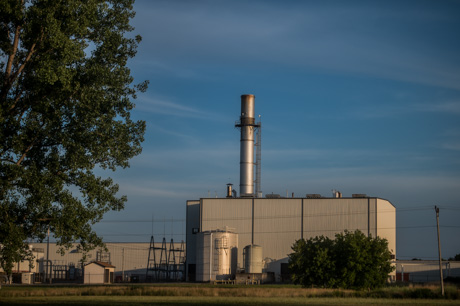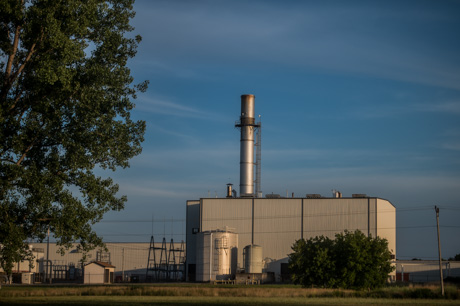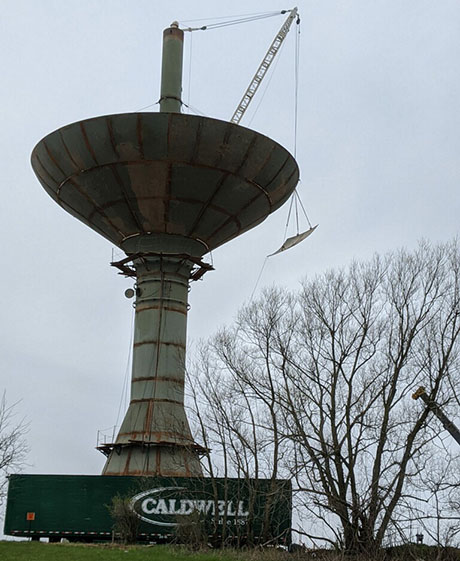Batavia power plant gets green light for water withdrawal access despite municipal appeals

Despite the letters of appeal with several reasons why city, town, and county officials did not want a company tapping into Batavia’s Well D, the Department of Environmental Conservation has ruled otherwise.
After a more than four-month review process of paperwork and supporting documentation from the applicant, Seneca Power Partners, and from city, town and county management and legal sources, the DEC has opted to grant Seneca a permit to “add Well D at the Batavia Well Field as a new permanent source of water supply.”
The permit has been granted for five years, with the option for Seneca Power Partners to reapply when that time is up.
“We have the same concerns we had when we issued the letters of concern (in July),” City Manager Rachael Tabelski said. “We outlined our concerns to the DEC, and we will meet with DPW and our legal counsel to determine the next steps.”
Tabelski wasn't quite certain how the DEC arrived at its decision, given some confusing supporting information.
Environmental Analyst Guillermo Saar sent the municipalities and Brian Gregson of SPP a letter on Nov. 18 regarding the decision and reasons for the approval (PDF). In short, the permit authorizes the withdrawal of up to 698,400 gallons per day, or a total of 26 million gallons per year of water for the purpose of system maintenance, boiler make-up water, and non-contact cooling to support the generation of electric power in accordance with the terms and conditions of this permit. Water is to be withdrawn from a new groundwater supply, Well D, located at the Batavia Power Plant.
The longer version cites each reason stated by town, city and county officials, and DEC’s response to each. An example of DEC’s reasons includes a dispute about how much of an impact this additional water draw would negatively affect the county.
The opposing sides cited a significantly lower season average trend that “continues to exacerbate the overuse of the aquifer,” versus DEC’s determination that groundwater level data over the period from October 2007 through July 2022 “do not show that the drought experienced from 2015 to 2017 is indicative of a long-term declining trend in aquifer storage, but rather, a discrete event around which water levels recovered to statistically normal conditions.”
Or, with the Town of Batavia’s request to consider the “collateral environmental impacts” of this extra water taken for the company’s production needs, DEC reviewed statistics and prior water levels and found that the highest yearly draw for two decades, up to 2021, was 22 million gallons -- four million gallons less than what DEC has allowed.
A projected pumping rate of 700 gallons per minute, which is the equivalent of 1.08 million gallons per day, “would not adversely impact the Tonawanda Creek Primary Aquifer,” Saar said.
In the city’s letter of appeal, attorney George Van Nest argued that the DEC must determine that the proposed water withdrawal takes proper consideration of other sources of water supply that may become available.
First, that option was not listed by Seneca in the November 2021 Engineer’s Report included with the new Water Withdrawal permit application, Saar said. And engineers deemed the potential re-use of discharge water unfeasible “because the O-At-Ka discharge water is too hot for the Batavia Power plant’s cooling use.”
Overall, it was not the answer municipal leaders were hoping for.
“Genesee County was certainly disappointed by the DEC permitting Seneca Power a permit to draw water from Well D,” County Manager Matt Landers said. “The County and City will continue to monitor the water levels in the aquifer with the hope this additional draw doesn’t have a material impact on the City Water Plant’s ability to draw water during peak demand days in the summer.”
Water concerns have been on the rise, as the county has continued to see an uptick in demand, and drier summer weather, coupled with the need for updated aquifer systems that are part of an ongoing three-phase water project.
"The county will continue to observe the use/access of the water,” Legislative Chairwoman Rochelle Stein said. “Our concerns will be noted to our state elected officials too. We rely on the ground water for a portion of our water supply.”
County Highway Superintendent and engineer Tim Hens has become the Paul Revere of water each summer, asking residents to temper their usage and warning that one day a serious drought could arrive.
He wasn’t too worried to hear the news of Seneca’s permit, at least not yet.
“There’s not a whole lot we can do at this point, it’s just going to be a wait-and-see. In most cases it shouldn’t be an issue for us unless we’re in periods of extended drought and groundwater has dropped precipitously,” Hens said. “We did do testing to show that their well could operate alongside of ours, and know we can handle short durations from both sources.”
However, it’s the long-term impacts on groundwater that have to be monitored, he said. And no one really knows for sure if and how much that may become a problem in the future.
At the beginning of July, City and Town of Batavia and Genesee County officials had joined forces to oppose the request for water that they believed could potentially affect the flow for area residents.
The three municipalities called upon environmental analyst Guillermo Saar of the state Department of Conservation to consider the burden that a request to draw 715,600 gallons a day would put on Batavia and Genesee County if granted.
Seneca Power Partners, a company at 163 Cedar St., Batavia, made the request through a permit application to DEC’s Division of Environmental Permits. The municipalities' response was swift.
“The major users of the Well Field (Genesee County, Town of Batavia, and City of Batavia) oppose this application and seek to help Seneca Power Partners find an alternative means to access untreated water for their operations. The aquifer directly feeds the Batavia Water Treatment Plant (owned by Genesee County, and operated by the City of Batavia) as a major source of drinking water,” the municipalities stated. “While the Tonawanda Creek also contributes as a source of drinking water, the quality and turbidity of the Creek make it a much less desirable source. Any excess extraction of water from the aquifer will force the Batavia Water Treatment Plant to rely more heavily on the Creek, and that will, in turn, increase the cost of municipal water treatment and decrease sustainability.”
In its application, a 662-page document stating its case with several supporting documents, Seneca Power Partners said that the use of water is “an integral part of the energy production process and is proportional to production.” More water is needed to produce more electricity. A simplified route the water takes looks something like this:
Water + heated by natural gas = steam = spins a turbine = goes into a generator = energy converted to electricity. The steam often evaporates and cannot be collected after the process, applicant John Trendowski, on behalf of the company, stated.
Prior coverage:
- Batavia company seeks permit for water
- Fluid issue pits Batavia company against city, town and county
File photo of Seneca Power Partners' Batavia-based power plant on Cedar Street, by Howard Owens.











